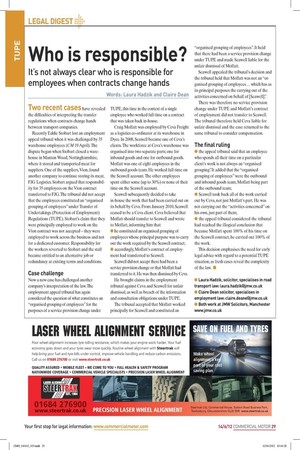Who is responsible?
Page 21

If you've noticed an error in this article please click here to report it so we can fix it.
It’s not always clear who is responsible for employees when contracts change hands
Words: Laura Hadzik and Claire Dean Two recent cases have revealed the difficulties of interpreting the transfer regulations when contracts change hands between transport companies.
Recently Eddie Stobart lost an employment appeal tribunal when it was challenged by 35 warehouse employees (CM 19 April). The dispute began when Stobart closed a warehouse in Manton Wood, Nottinghamshire, where it stored and transported meat for suppliers. One of the suppliers, Vion, found another company to continue storing its meat, FJG Logistics. Stobart argued that responsibility for 35 employees on the Vion contract transferred to FJG. The tribunal did not accept that the employees constituted an “organised grouping of employees” under Transfer of Undertakings (Protection of Employment) Regulations (TUPE). Stobart’s claim that they were principally employed to work on the Vion contract was not accepted – they were employed to work across the business and not for a dedicated customer. Responsibility for the workers reverted to Stobart and the staff became entitled to an alternative job or redundancy at existing terms and conditions.
Case challenge
Now a new case has challenged another company’s interpretation of the law. The employment appeal tribunal has again considered the question of what constitutes an “organised grouping of employees” for the purposes of a service provision change under TUPE, this time in the context of a single employee who worked full-time on a contract that was taken back in-house.
Craig Moffatt was employed by Ceva Freight as a logistics co-ordinator at its warehouse in Dyce. In 2008, Seawell became one of Ceva’s clients. The workforce at Ceva’s warehouse was organised into two separate parts; one for inbound goods and one for outbound goods. Moffatt was one of eight employees in the outbound goods team. He worked full-time on the Seawell account. The other employees spent either some (up to 30%) or none of their time on the Seawell account.
Seawell subsequently decided to take in-house the work that had been carried out on its behalf by Ceva. From January 2010, Seawell ceased to be a Ceva client. Ceva believed that Moffatt should transfer to Seawell and wrote to Moffatt, informing him that: • he constituted an organised grouping of employees whose principal purpose was to carry out the work required by the Seawell contract; • accordingly, Moffatt’s contract of employment had transferred to Seawell.
Seawell did not accept there had been a service provision change or that Moffatt had transferred to it. He was then dismissed by Ceva.
He brought claims in the employment tribunal against Ceva and Seawell for unfair dismissal, as well as breach of the information and consultation obligations under TUPE.
The tribunal accepted that Moffatt worked principally for Seawell and constituted an “organised grouping of employees”. It held that there had been a service provision change under TUPE and made Seawell liable for the unfair dismissal of Moffatt.
Seawell appealed the tribunal’s decision and the tribunal held that Moffatt was not an “organised grouping of employees... which has as its principal purposes the carrying out of the activities concerned on behalf of [Seawell]”.
There was therefore no service provision change under TUPE and Moffatt’s contract of employment did not transfer to Seawell. The tribunal therefore held Ceva liable for unfair dismissal and the case returned to the same tribunal to consider compensation.
The final ruling
• the appeal tribunal said that an employee who spends all their time on a particular client’s work is not always an “organised grouping”. It added that the “organised grouping of employees” were the outbound and inbound goods team, Moffatt being part of the outbound team; • Seawell took back all of the work carried out by Ceva, not just Moffatt’s part. He was not carrying out the “activities concerned” on his own, just part of them; • the appeal tribunal considered the tribunal had reached the illogical conclusion that because Moffatt spent 100% of his time on the Seawell contract, he carried out 100% of the work.
This decision emphasises the need for early legal advice with regard to a potential TUPE situation, as fresh cases reveal the complexity of the law. n
• Laura Hadzik, solicitor, specialises in road transport law: laura.hadzik@jmw.co.uk • Claire Dean solicitor, specialises in employment law: claire.deane@jmw.co.uk • Both work at JMW Solicitors, Manchester www.jmw.co.uk










































